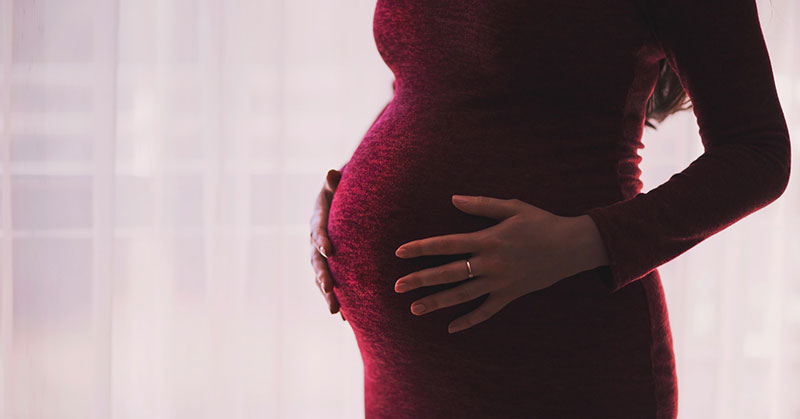
Graphic © herbshealthhappiness.com
In 2017, a study made on sleep disorders and premature births made its rounds across the world wide web and various news outlets. Lead researcher Jennifer Felder’s study entitled “Sleep Disorder Diagnosis During Pregnancy and Risk of Preterm Birth” involved three million women in California from 2007 to 2012. Out of this cohort, those included were 4344 women with single neonates born between 20 and 44 weeks of gestation, without congenital problems. Half of these women experienced sleep disorders while the other half didn’t and served as the control group. [1]
The results were conclusive — (1) women who had insomnia during pregnancy were 30 percent more likely to have preterm birth and that this statistic (2) increased to 40 percent when the mother is affected by sleep apnea. While other sleep disorders were identified like narcolepsy, excessive sleepiness, and restless leg syndrome, the study focused on the two: insomnia and sleep apnea, which were the most common and statistically significant. Furthermore, Felder, et al. found that sleep disorders increased the risk of very premature births, or births with less than 34 weeks of gestation, affecting 5.3% of women with sleep problems. These numbers were much lower among normal women without sleep problems, wherein the statistic was only 2.9%. [2]
Dangers Of Sleep Disorders
The big problem this study presents is that sleep disorders are often under-diagnosed or undiagnosed because sleep problems are common in pregnant women. If mothers aren’t diagnosed correctly, they won’t be adequately prepared for any problems that may arise because of their sleep disorder. Looking at the problem from a wider-point of view shows that by helping these women with their sleep disorder means we could save thousands of babies’ lives, not only from mortality but also morbidity. The world’s statistics on premature birth are scary: 15 million preemies are born each year (those born before 37 weeks of gestation); that’s 1 in every 10 births in the United States. If mothers are diagnosed earlier, we can significantly cut down on those numbers. [3]
Premature Birth Places Babies At Higher Risk Of Various Conditions
• Intestinal problems, like necrotizing (a condition where the intestines get inflamed, scarred, and blocked. Babies often need surgery in order to get rid of the scarred tissue and restore the normal function of the gastrointestinal tract)
• Infections, like pneumonia (lung infection) and meningitis (inflammation of the brain and brain stem) Vision problems like retinopathy of prematurity (ROP)
• Hearing loss (very common in premature babies)
• Dental problems (delays in normal tooth development) [4]
Get Checked And Try Out These Natural Sleep Aids
If you are an expecting mother or planning to be a parent, be sure to get checked out by your doctor if you have any problems with sleeping. You might think that sleepless nights are typical during pregnancy, you are wrong. Keep yourself safe and your baby as well. You can try meditation, aromatherapy, music or sound therapy, and even lavender or chamomile tea before bed to help you sleep. If these tips don’t work, it’s best to get seen by a medical professional to get a complete work up. Prevention is the key!
References:
[1] Felder, J. (2017). Sleep Disorder Diagnosis During Pregnancy and Risk of Preterm Birth. https://www.ncbi.nlm.nih.gov/pubmed/28796676
[2] Bakalar, N. (2017). Sleep Problems in Pregnancy Tied to Premature Births. https://www.nytimes.com/2017/08/08/well/family/sleep-problems-in-pregnancy-tied-to-premature-births.html
[3] Maxmen, A. (2017). Insomnia Linked to Premature Birth in Study of 3 Million Mothers. https://www.scientificamerican.com/article/insomnia-linked-to-premature-birth-in-study-of-3-million-mothers1/
[4] March of Dimes. Long-term Health Effects of Premature Birth. https://www.marchofdimes.org/complications/long-term-health-effects-of-premature-birth.aspx
★ Get My Books - 100% FREE:
😳 Tinnitus And Brain Health?
After 47 years of studies and countless brain scans done on more than 2,400 tinnitus patients, scientists at the MIT Institute found that in a shocking 96% of cases, tinnitus was actually shrinking their brain cells.
As it turns out, tinnitus and brain health are strongly linked.
Even more interesting: The reason why top army officials are not deaf after decades of hearing machine guns, bombs going off and helicopter noises…
Is because they are using something called "the wire method", a simple protocol inspired by a classified surgery on deaf people from the 1950s...
★ How To Get Rid Of Nail Fungus:
★ Does Your Salad Contain This Vegetable?
★ 20 Natural Painkillers In Your Kitchen (Video):
★ Men's Prostate Health:

2. Famous Chef Sheds 60lbs Researching New Paleo Recipes: Get The Cookbook FREE Here
3. #1 muscle that eliminates joint and back pain, anxiety and looking fat
4. 7 odd foods that KILL your abdominal fat (surprising fat-fighters)
5. The TRUTH about bread (Will surprise you!)
6. [PROOF] Reverse Diabetes with a "Pancreas Jumpstart"
7. Here's What Happens When You "Unlock Your Hip Flexors"
8. The #1 WORST food that CAUSES Faster Aging (beware -- Are you eating this?)
The #1 Muscle That Eliminates Joint And Back Pain, Anxiety And Looking Fat
By Mike Westerdal CPT
Can you guess which muscle in your body is the #1 muscle that eliminates joint and back pain, anxiety and looking fat?
This is especially important if you spend a significant amount of time sitting every day (I do, and this really affects me in a big way!)
Working this "hidden survival muscle" that most people are simply not training because no-one ever taught them how will boost your body shape, energy levels, immune system, sexual function, strength and athletic performance when unlocked.
If this "hidden" most powerful primal muscle is healthy, we are healthy.
Is it...
a) Abs
b) Chest
c) Glutes
d) Hip Flexors
Take the quiz above and see if you got the correct answer!
P.S. Make sure you check out this page to get to know the 10 simple moves that will bring vitality back into your life:
If you enjoyed this page:














